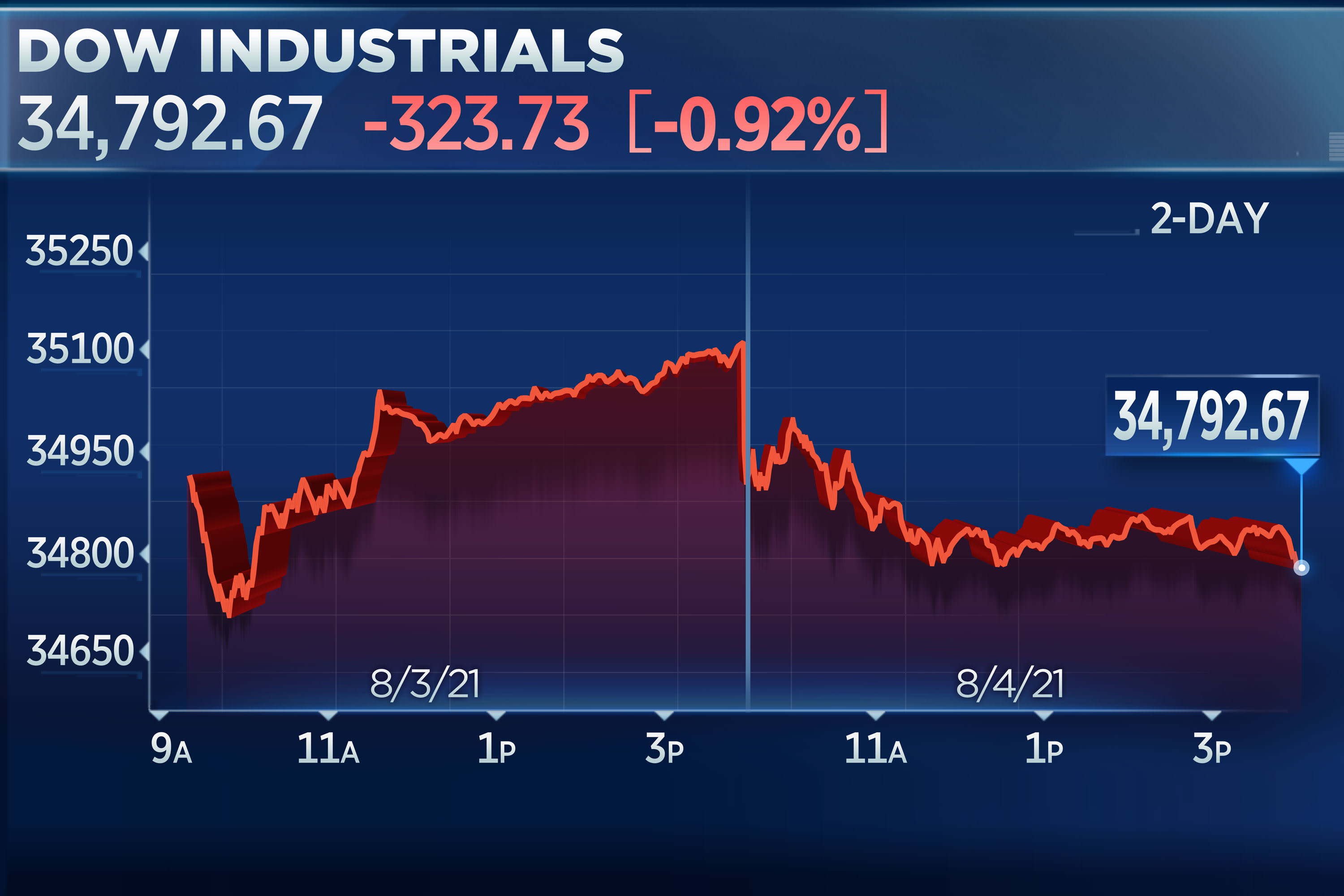Dow falls 300 points, S&P 500 slips from record high after jobs data disappoints

U.S. stocks fell on Wednesday after the earnings of a major automaker and a private sector jobs report came in lower than expected.
The Dow Jones Industrial Average shed 323.73 points, or 0.9%, and closed near its session low at 34,792.67. The S&P 500 slipped by 0.5% to finish at 4,402.66, while the Nasdaq Composite ticked up 0.1% to 14,780.53. The dip for the broader market came after the S&P 500 set a record closing high on Tuesday.
Shares of General Motors fell about nearly 9%, weighing on the broader market, after the automaker missed earnings expectations for the second quarter. The automaker did raise its guidance for a key profit metric for the rest of the year.
The ADP private payroll survey showed a gain of 330,000 jobs for July, well short of the consensus estimate of 653,000. The Labor Department’s official jobs report, which typically has more impact with investors, will be released on Friday.
Second-quarter earnings and economic data have been strong overall, but some investors are worried that the rebound from last year’s pandemic will slow from here.
“Right now I think that the market is moving forward a little cautiously with the triple-peak theory — the potential peak in earnings, peak in economic growth and the potential peak in stimulus looming, both fiscally and from a monetary perspective,” said Chris Osmond, chief investment officer at Prime Capital Investment Advisors.
“While earnings and growth may be peaking, it doesn’t mean that they’re going to go negative, just decelerate,” Osmond added.
Cyclical stocks that are tied to the economic recovery were some of the weakest performers on Wednesday. Energy stocks fell, along with oil prices, with Chevron dropping more than 2%. Banks and industrials, such as Honeywell, also struggled. Shares of Coca-Cola lost more than 1%.
This week’s labor market readings come as the delta variant of Covid 19 has spread across the U.S., leading to new restrictions and mandates from some companies and local governments.
“We need consumers out and about spending money, not sitting at home with nowhere to go and/or worried about the coronavirus,” Wells Fargo Investment Institute strategist Scott Wren said in a note. “But based on the fact that the major equity indexes are near all-time record highs, one can make a rational argument that right now investors are not all that worried about the Delta variant’s potential for rattling the economy.”
The 10-year Treasury yield was trading flat near 1.8% on Wednesday after briefly dipping below 1.13% earlier in the session. In recent weeks, lower bonds yields lately have tended to set a more bearish tone for equities, by triggering concerns about the pace of the economic comeback, though that relationship appeared to break down on Wednesday.
Yields trimmed their losses after the ISM Services purchasing manager’s index for July came in at a record high, beating expectations. Additionally, Federal Reserve Vice Chairman Richard Clarida said Wednesday that he expects the central bank to raise interest rates starting in 2023 and that there is upside risk to inflation.
Meanwhile, shares of Robinhood surged 50%, continuing a volatile jump after last week’s soft initial public offering. Semiconductor stocks were another bright spot, with Nvidia and Advanced Micro Devices rising.
In the regular trading session on Tuesday, the Dow Jones Industrial Average jumped 278 points. The S&P 500 gained 0.8% to a new all-time closing high of 4,423.15. The Nasdaq Composite rose 0.6%.




